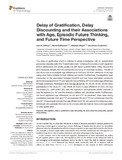Citation link:
http://dx.doi.org/10.25819/ubsi/10057| DC Field | Value | Language |
|---|---|---|
| crisitem.author.orcid | 0000-0002-2268-3354 | - |
| crisitem.author.orcid | 0000-0002-2001-2522 | - |
| crisitem.author.orcid | 0000-0003-0580-1512 | - |
| dc.contributor.author | Göllner, Lars M. | - |
| dc.contributor.author | Ballhausen, Nicola | - |
| dc.contributor.author | Kliegel, Matthias | - |
| dc.contributor.author | Forstmeier, Simon | - |
| dc.date.accessioned | 2022-01-19T13:02:44Z | - |
| dc.date.available | 2022-01-19T13:02:44Z | - |
| dc.date.issued | 2017 | de |
| dc.description | Finanziert aus dem Open-Access-Publikationsfonds der Universität Siegen für Zeitschriftenartikel | de |
| dc.description.abstract | The delay of gratification (DoG) in children is widely investigated with an experimental procedure originally called the “marshmallow test,” whereas the studies on self-regulation (SR) in adolescents and adults usually use self-report questionnaires. Delay discounting (DD) measures simplify the DoG procedure and focus on monetary rewards. The aim of this study was to investigate age differences in DoG and DD from childhood to old age using a test that is suitable for both children and adults. Furthermore, investigations were conducted on the association between DoG/DD and two future orientation constructs [future time perspective (FTP) and episodic future thinking (EFT)] as well as age differences in these constructs. Participants from five age groups (9–14, 18–25, 35–55, 65–80, 80+) participated in the study (N = 96). While we found no age difference for DoG, DD was the lowest [i.e., self-control (SC) was the highest] in young/middle adults; however, it was the highest (i.e., SC was the lowest) in children and old/oldest adults. Furthermore, we found significant age differences for DD and FTP. As predicted, there were strong correlations between DoG and FTP and between DD and FTP, but not between DoG/DD and EFT. These results indicate that age differences in SR vary across themeasures used. Individuals who generally think and act in a future-oriented manner have a stronger ability to delay gratification. | en |
| dc.identifier.doi | http://dx.doi.org/10.25819/ubsi/10057 | - |
| dc.identifier.uri | https://dspace.ub.uni-siegen.de/handle/ubsi/2134 | - |
| dc.identifier.urn | urn:nbn:de:hbz:467-21346 | - |
| dc.language.iso | en | de |
| dc.source | Frontiers in psychology ; 8, article 2304. - https://doi.org/10.3389/fpsyg.2017.02304 | de |
| dc.subject.ddc | 150 Psychologie | de |
| dc.subject.other | Self-regulation | en |
| dc.subject.other | Life span | en |
| dc.subject.other | Delay of gratification | de |
| dc.subject.other | Delay discounting | de |
| dc.subject.other | Future time perspective | de |
| dc.subject.other | Episodic future thinking | de |
| dc.subject.swb | Lebenslauf / Entwicklungspsychologie | de |
| dc.subject.swb | Zeitperspektive | de |
| dc.subject.swb | Zukunftsplanung | de |
| dc.subject.swb | Belohnungsaufschub | de |
| dc.title | Delay of gratification, delay discounting and their associations with age, episodic future thinking, and future time perspective | en |
| dc.type | Article | de |
| item.fulltext | With Fulltext | - |
| ubsi.publication.affiliation | Department Erziehungswissenschaft · Psychologie | de |
| ubsi.source.issn | 1664-1078 | - |
| ubsi.source.issued | 2018 | de |
| ubsi.source.issuenumber | 8 | de |
| ubsi.source.pages | 15 | de |
| ubsi.source.place | Lausanne | de |
| ubsi.source.publisher | Frontiers Research Foundation | de |
| ubsi.source.title | Frontiers in psychology | de |
| ubsi.subject.ghbs | HSA | de |
| ubsi.subject.ghbs | HSX | de |
| Appears in Collections: | Geförderte Open-Access-Publikationen | |
Files in This Item:
| File | Description | Size | Format | |
|---|---|---|---|---|
| Delay_of_gratification.pdf | 444.47 kB | Adobe PDF |  View/Open |
This item is protected by original copyright |
Page view(s)
316
checked on Nov 28, 2024
Download(s)
126
checked on Nov 28, 2024
Google ScholarTM
Check
Altmetric
Items in DSpace are protected by copyright, with all rights reserved, unless otherwise indicated.

